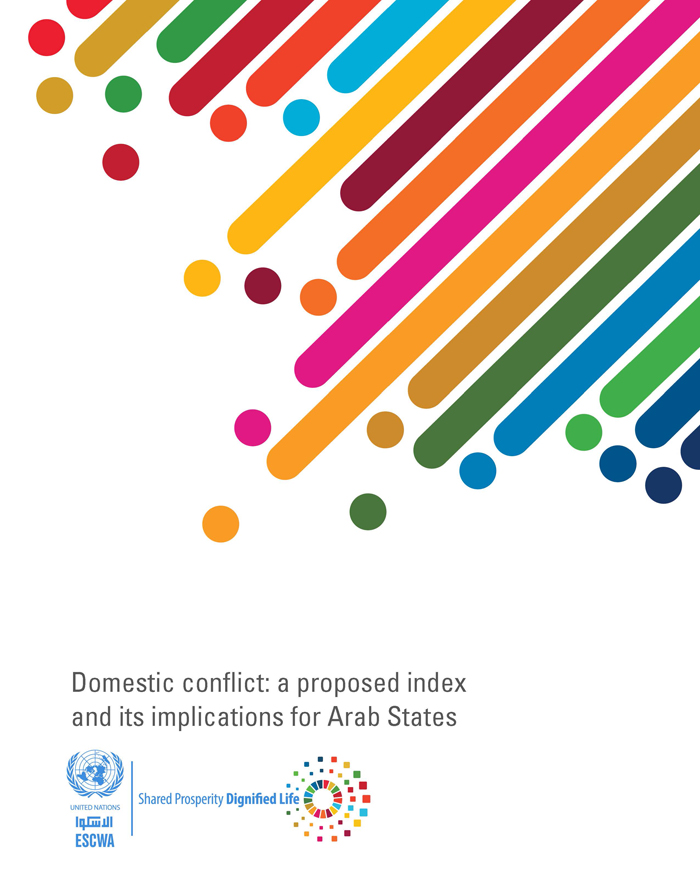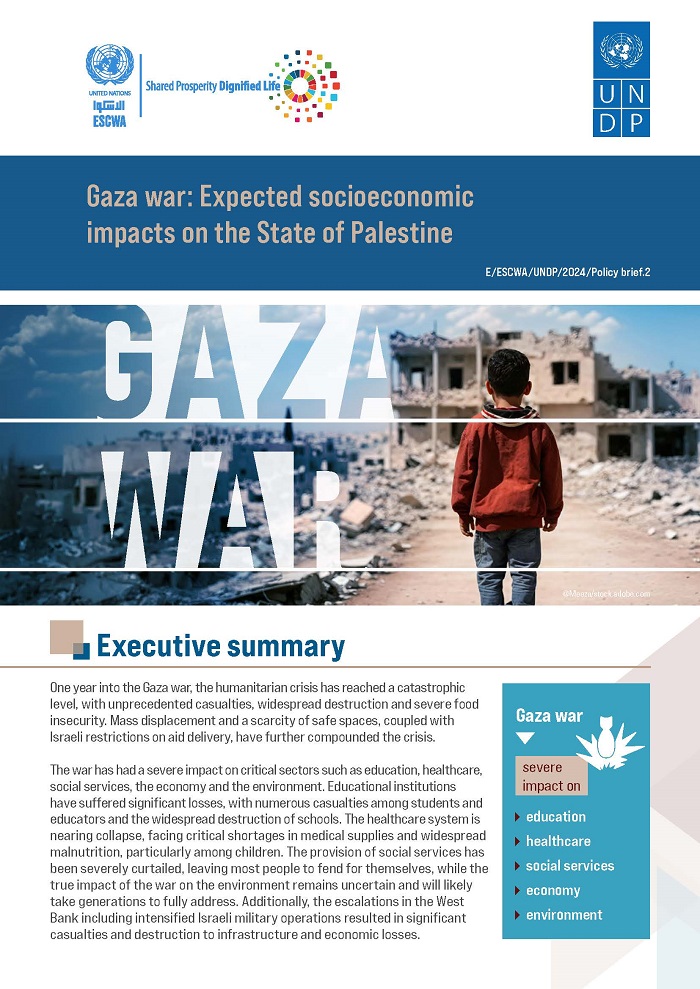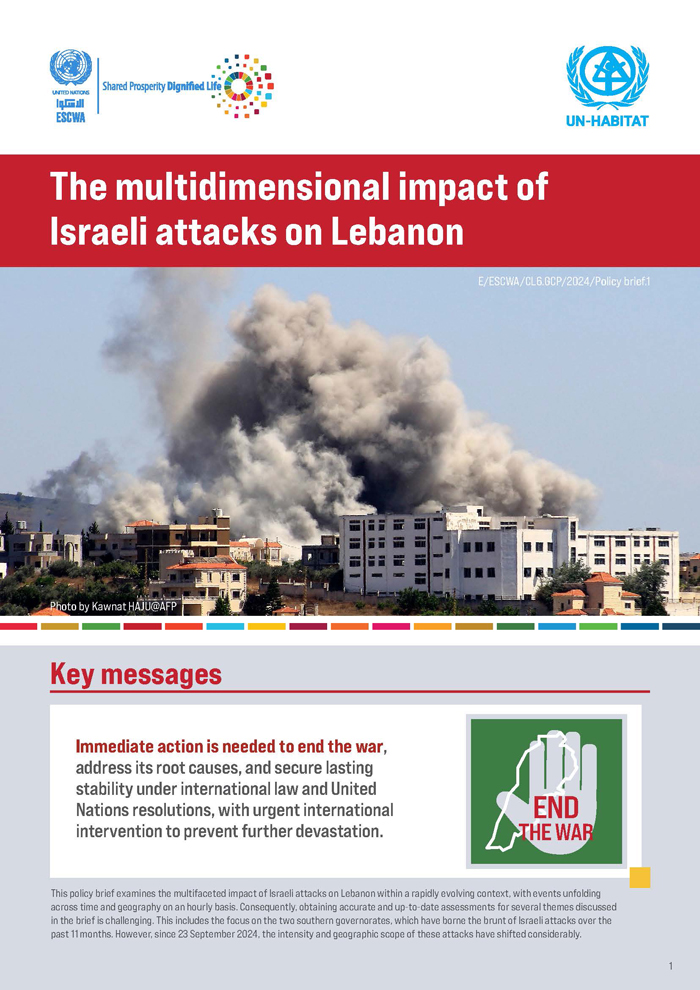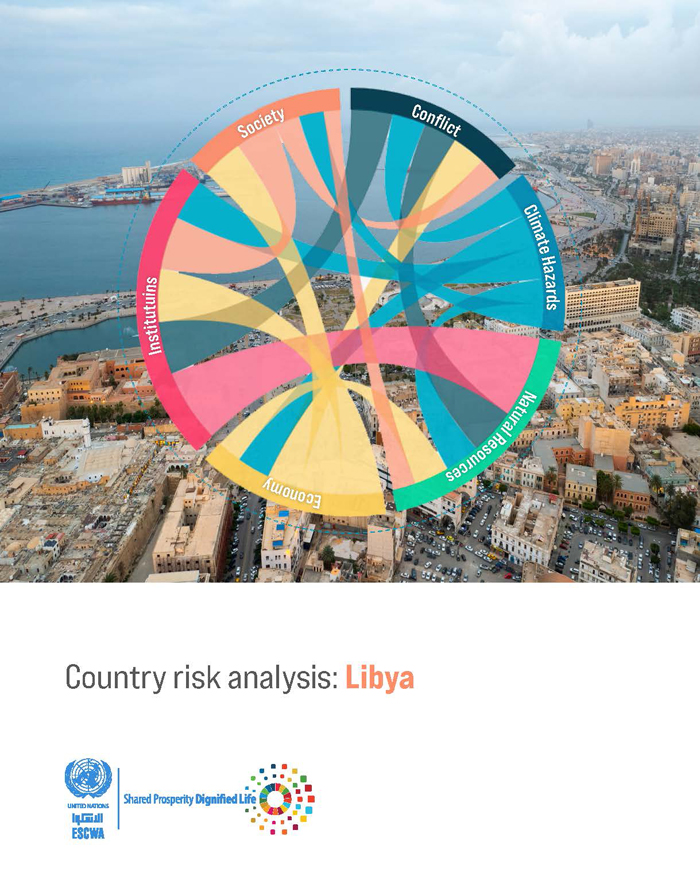
ESCWA Publication: E/ESCWA/CL6.GCP/2021/TP.6
Country: Arab region
Publication Type: Information material
Cluster: Governance and Conflict Prevention
Focus Area: Resilient development & conflict prevention
Initiatives: Development challenges
SDGs: Goal 16: Peace, Justice and Strong Institutions
Keywords: Conflict, Economic recession, Employment, Governance, Human development
Domestic conflict: a proposed index and its implications for Arab States
July 2021
This paper proposes a domestic conflict index that can be used by policy makers and other relevant stakeholders to assess a given country’s level of internal conflict. The index can be used to conduct a simple assessment of conflict and its intensity on the basis of two indicators, namely a conflict score, which assesses the incidence and human toll of conflict, and forcibly displaced population as a share of the total population. This paper first argues the case for these indicators and argues that despite a number of limitations, the proposed index is a significant improvement over other indices on conflict, with which there is a significant degree of correlation.
A number of key findings emerge from the domestic conflict index scores for the various countries. Firstly, conflict is strongly associated with governance systems and human rights. Countries with weak governance and human rights protection mechanisms are at increased risk of conflict. Indeed, it may be argued that good governance and respect for human rights and fundamental freedoms is a necessary precondition for reducing the possibilities of domestic conflict. Secondly, despite the aforementioned assertion, not all Arab countries with poor human rights and governance deficits have experienced conflict. Indeed, as was the case in the Syrian Arab Republic and Libya prior to the start of the domestic conflicts in those countries, many Arab countries continue to enjoy relative stability despite significant governance and human rights deficits. Thirdly, a significant increase in levels of conflict has occurred in the region since 2010. In 2019, three countries, namely Somalia, the Syrian Arab Republic and Yemen reached the maximum score of five on the domestic conflict index while five countries experienced an increase in conflict.
An important observation is the apparent paradox of relative stability of many Arab countries despite their poor governance and human rights records. Studies on the political economy of the region have drawn a number of conclusions to explain that paradox, including that an authoritarian bargain has been struck in many Arab countries, which, in essence, entails the trading of freedoms and democratic governance in exchange for rents and other benefits. The Arab rentier State, with its current institutional capacity and governance framework, is ill-equipped to address the multiple challenges of environmental resource unsustainability, economic recession and low levels of decent employment, particularly in the context of the ongoing COVID-19 pandemic, rising levels of poverty and inequality, and several large scale and long-standing conflicts. Therefore, Arab countries need to move beyond short-term fixes to address the structural root causes of conflict.
Related content
Resilient development & conflict prevention
,
This paper proposes a domestic conflict index that can be used by policy makers and other relevant stakeholders to assess a given country’s level of internal conflict. The index can be used to conduct a simple assessment of conflict and its intensity on the basis of two indicators, namely a conflict score, which assesses the incidence and human toll of conflict, and forcibly displaced population as a share of the total population. This paper first argues the case for these indicators and argues that despite a number of limitations, the proposed index is a significant improvement over other indices on conflict, with which there is a significant degree of correlation.
A number of key findings emerge from the domestic conflict index scores for the various countries. Firstly, conflict is strongly associated with governance systems and human rights. Countries with weak governance and human rights protection mechanisms are at increased risk of conflict. Indeed, it may be argued that good governance and respect for human rights and fundamental freedoms is a necessary precondition for reducing the possibilities of domestic conflict. Secondly, despite the aforementioned assertion, not all Arab countries with poor human rights and governance deficits have experienced conflict. Indeed, as was the case in the Syrian Arab Republic and Libya prior to the start of the domestic conflicts in those countries, many Arab countries continue to enjoy relative stability despite significant governance and human rights deficits. Thirdly, a significant increase in levels of conflict has occurred in the region since 2010. In 2019, three countries, namely Somalia, the Syrian Arab Republic and Yemen reached the maximum score of five on the domestic conflict index while five countries experienced an increase in conflict.
An important observation is the apparent paradox of relative stability of many Arab countries despite their poor governance and human rights records. Studies on the political economy of the region have drawn a number of conclusions to explain that paradox, including that an authoritarian bargain has been struck in many Arab countries, which, in essence, entails the trading of freedoms and democratic governance in exchange for rents and other benefits. The Arab rentier State, with its current institutional capacity and governance framework, is ill-equipped to address the multiple challenges of environmental resource unsustainability, economic recession and low levels of decent employment, particularly in the context of the ongoing COVID-19 pandemic, rising levels of poverty and inequality, and several large scale and long-standing conflicts. Therefore, Arab countries need to move beyond short-term fixes to address the structural root causes of conflict.



